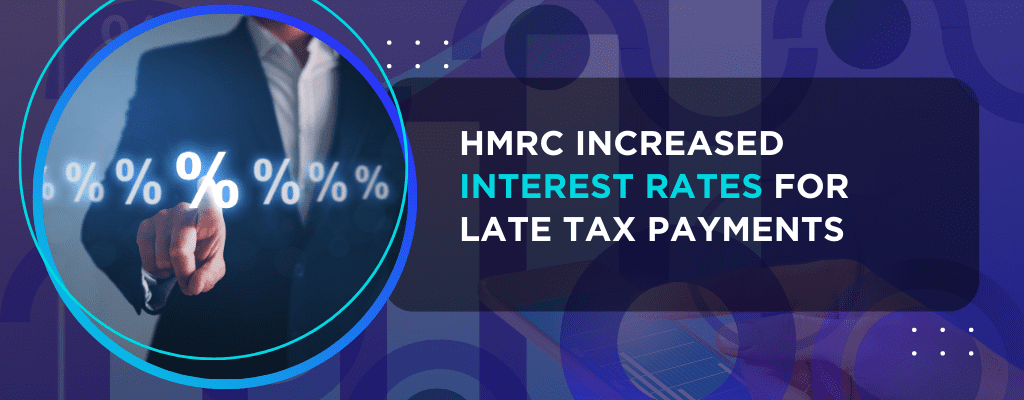Low Earners Fined for Not Filing Unnecessary Self-Assessment Tax Return
HMRC Increased Interest Rates for Late Payments Once Again! Here are Key Insights for UK Accountants…
Every twist and turn of financial legislation can influence professionals and their clients in the complex accounting sector. The most recent wave stems from HMRC’s decision to raise interest rates on late tax payments, which sparked debate among accountants and taxpayers alike. In this detailed blog, we’ll go into the intricacies of this move, look at real-world instances, examine statistics on its possible impact, and answer frequently asked questions to prepare UK accountants for the road ahead. HMRC increased interest rates determined through legal provisions and are directly tied to the Bank of England’s base rate.
HMRC’s Interest Rates Categories
HMRC’s Interest rates fall into two categories:
- Late Payment Interest Rate: This rate adds 2.5% to the current base rate. Its purpose is to motivate timely tax payments, promoting equity among taxpayers who meet their payment deadlines.
- Repayment Interest Rate: This rate is derived by subtracting 1% from the prevailing base rate, with a minimum threshold of 0.5%. Commonly referred to as the ‘minimum floor’, this rate aims to fairly compensate taxpayers who have overpaid by accounting for the opportunity cost of their money.
The late payment interest rate encourages punctual settlement of taxes, ensuring that those who fulfil their tax obligations promptly are treated fairly. On the other hand, the repayment interest rate aims to provide equitable compensation to taxpayers who have overpaid their taxes by acknowledging the potential loss of earnings due to the tied-up funds.
Current Late Payments & Repayment Interest:
The current rates for late payment and repayment interest, which apply to the primary taxes and duties subject to interest charges and payments by HMRC, are as follows:
The late payment interest rate is 7.75% will be effective from 22 August 2023.
The repayment interest rate stands at 4.25% starting from 22 August 2023.
Understanding HMRC’s Interest Rate Adjustment
Undoubtedly, the escalating cost-of-living crisis bears significant responsibility, and its repercussions even extend to interest rates. This phenomenon has prompted the Bank of England to make a noteworthy adjustment by elevating the base interest rate to 5%, marking a rise from the previous 4.5% to curb inflation rates.
This development carries weight as HMRC relies on the Bank of England‘s base rate as a foundation for its interest rate calculations. Consequently, any surge in the base rate directly impacts the interest rates set by HMRC. HMRC has made a noteworthy adjustment by raising interest rates for late tax payments. This alteration emphasises the significance of timely tax compliance and financial responsibility.
A Closer Look:
The adjustment entails higher interest charges on overdue tax payments. The idea is to incentivise taxpayers to meet their tax deadlines and avoid accumulating unnecessary interest charges. This development has significant implications for individuals and businesses across the UK.
Real-World Impact: How Accountants Are Affected by Interest Rates?

Providing Financial Direction:
Accountants are essential in assisting customers in navigating the complicated taxes landscape. With the increase in interest rates, their consulting and strategic planning duties become even more important.
The Dilemma of a Small Business Owner:
Consider a small company owner needing to meet a tax payment deadline due to unanticipated cash flow challenges. Higher interest payments might strain the company’s financial resources even more with the interest rate rise.
Individual Taxpayer’s Perspective:
An individual taxpayer facing personal financial challenges might need help to pay their tax on time. The increased interest rates could compound their financial burden, making it harder to get back on track.
Navigating the Future: A Call to Action for Accountants
As the tides of financial regulations change, accountants find themselves in the captain’s seat, guiding their clients through uncharted waters. Here’s how they can navigate this evolving landscape:
Proactive Communication: Accountants should educate clients about the interest rate changes and the importance of meeting tax deadlines to avoid increased interest charges.
Strategic Planning: Collaborate with clients to develop robust financial plans that factor in tax liabilities and deadlines, reducing the risk of unnecessary interest accumulation.
Empowerment through Knowledge: Stay abreast of HMRC’s official updates, develop professionally, and share insights with peers to adapt to changes collectively.
Addressing FAQs for Clarity

Q1: How much are interest rates being raised?
A: The specific increase varies depending on the kind of tax and the length of the delay. For correct information, it is critical to consult HMRC’s official notification.
Q2: What if customers are genuinely unable to pay on time?
A: Accountants should advise customers to speak with HMRC if they are experiencing financial difficulties. HMRC may provide payment schedules or deferment alternatives depending on the circumstances.
Q3: How can accountants remain up to date on these changes?
A: Following HMRC’s official channels, attending industry webinars, and participating in professional networks may all assist accountants in remaining up to speed on legislative developments.
Q4: Why has HMRC increased late payment interest rates?
A: HMRC modifies interest rates to match economic conditions and encourages tax payments to be made on time. The current increase might be attributed to inflationary worries or other financial considerations.
Q5: How would rising interest rates affect my tax liabilities?
A: If you miss tax payment dates, the higher interest rates will result in more considerable late payment penalties. Paying your tax bills on time is critical to prevent accruing additional interest costs.
Q6: Will the increase in interest rates affect all sorts of taxes equally?
Interest rates may differ depending on the type of tax owed. Different taxes may have various interest rate systems. It is best to seek HMRC information or expert guidance to comprehend them.
On A Final Note:
Change is a constant in the financial world, and the increase in interest rates for late tax payments is a testament to that reality. Accountants in the UK play an essential role in translating these changes into actionable strategies for their client’s financial well-being.
As we sail into this new era of interest rates, let’s remember that accountants are not just navigators but also educators, advocates, and partners in ensuring financial health. By embracing change, staying informed, and guiding their clients responsibly, accountants can chart a course towards a prosperous financial future for all.
For the latest updates and detailed information on interest rate adjustments, refer to HMRC’s official website or contact HMRC directly.
Remember, as an accountant, your role goes beyond numbers; you’re a steward of financial well-being, steering clients towards stability amidst shifting tides.

